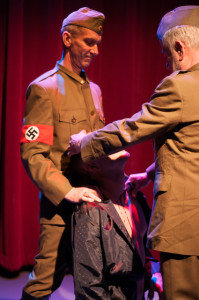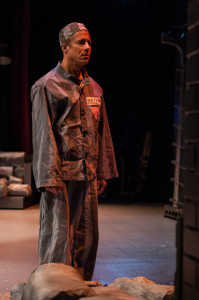Arts Week
Martin Sherman’s BENT at the Provincetown Theater
 Michael Steers’ production of Bent at the Provincetown Theater takes its audience—irrespective of sexual preferences—to places that no one wants to go, and does so with refinement, dignity, and—occasionally—humor. Bent targets everyone: it questions the meaning of self, it examines how one handles ethical dilemmas with life-and-death consequences, and it demands an understanding of responsibility.
Michael Steers’ production of Bent at the Provincetown Theater takes its audience—irrespective of sexual preferences—to places that no one wants to go, and does so with refinement, dignity, and—occasionally—humor. Bent targets everyone: it questions the meaning of self, it examines how one handles ethical dilemmas with life-and-death consequences, and it demands an understanding of responsibility.
When the play was first produced, in 1979, very little knowledge about the experience of homosexuals under the Nazi régime was actually available; it is the play that in many ways spurred the research. The truth is, of course, that Jews were not the only victims systematically marked for eradication: gypsies, Jehovah’s Witnesses, the mentally handicapped, intellectuals, vagrants, prostitutes, Freemasons … and homosexuals, who were at the nadir of a list of victims, even in the rankings of fellow prisoners. Wearing a pink triangle—the public identification of gays—on one’s jacket meant to be despised by everyone.
 Sherman exposes that pecking order most clearly when one gay prisoner opts to wear the Star of David—even though he is not himself Jewish—rather than the pink triangle once he’s incarcerated at Dachau.
Sherman exposes that pecking order most clearly when one gay prisoner opts to wear the Star of David—even though he is not himself Jewish—rather than the pink triangle once he’s incarcerated at Dachau.
The play’s protagonist is Max, an unattractive hedonist in a very liberal 1930s Berlin who openly pursues his desires, “making deals” and drinking/drugging his way through nights at a gay club owned by drag queen Greta, much to the disappointment of his boyfriend Rudy, a dancer at the club. We meet Max and Rudy at four pm on one of many “mornings-after,” which changes dramatically when the SS storm into the flat and kill the man Max brought home with him from the club. This is the start of the Night of the Long Knives, an internal shakeup in the Nazi power structure that changes Berlin forever.
Max and Rudy flee, but are eventually caught and sent to Dachau; Max becomes even more unattractive to the audience when he is faced with the classical dilemma of the biblical Peter, and not only denies knowing Rudy but helps to kill him.
 The second half of the play takes place completely at Dachau, where Max and another inmate, Horst, develop a relationship. They spend their time moving stones from one area of the camp to another before moving them back again; Max says he thinks this is designed to drive them mad.
The second half of the play takes place completely at Dachau, where Max and another inmate, Horst, develop a relationship. They spend their time moving stones from one area of the camp to another before moving them back again; Max says he thinks this is designed to drive them mad.
Does Max recapture his lost humanity? What kind of relationship can develop when one cannot even talk to others, much less touch them? How does one come to terms with a limited future and a regretted past? The play poses more questions than it answers.
Steers’ casting is inspired. Bretten Burger does well with the difficult job of showing a man change through a mere two hours onstage, without losing sight that growth doesn’t necessarily entail a complete change of character; by the end of the play, he remembers that he may have once loved a dancer, but cannot remember Rudy’s name. Robert Junker, Mark Weinress, Titus Ulrich all are excellent and believable.
If I’m to single out anyone, though, it has to be Bragan Thomas, who seriously comes into his own as Rudy, making the dancer flamboyant without ever crossing into mockery.
And of course (as always) Michael Steers’ set deign is pitch-perfect. The lighting suggests more than it reveals—I was convinced at one point that there was a frosting of snow on the piles of rocks at the concentration camp—and the minimalism works well in a world where everything beloved and secure is stripped away. Steers has some very large shoes to fill in the light of past productions, and he comes through.
At a time when events in the 21st century seem to be copying those of the 20th, Bent remains an unfortunately relevant and important play. Go see it.
***
Jeannette de Beauvoir is the host of Arts Week on WOMR, a contributing writer to Provincetown Magazine, and a novelist, editor, and marketing writer. More about her at linkedin.com/in/jeannettedebeauvoir












